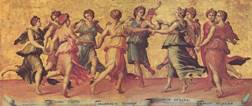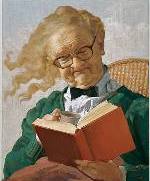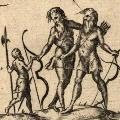A Naturalist's Voyage Round the WorldOn the 19th of August we finally left the shores of Brazil. I thank God, I shall never again visit a slave-country. To this day, if I hear a distant scream, it recalls with painful vividness my feelings, when passing a house near Pernambuco, I heard the most pitiable moans, and could not but suspect that some poor slave was being tortured, yet knew that I was as powerless as a child even to remonstrate. I suspected that these moans were from a tortured slave, for I was told that this was the case in another instance. Near Rio de Janeiro I lived opposite to an old lady, who kept screws to crush the fingers of her female slaves. I have stayed in a house where a young household mulatto, daily and hourly, was reviled, beaten, and persecuted enough to break the spirit of the lowest animal. I have seen a little boy, six or seven years old, struck thrice with a horse-whip (before I could interfere) on his naked head, for having handed me a glass of water not quite clean; I saw his father tremble at a mere glance from his master's eye. These latter cruelties were witnessed by me in a Spanish colony, in which it has always been said that slaves are better treated than by the Portuguese, English, or other European nations. I have seen at Rio de Janeiro a powerful negro afraid to ward off a blow directed, as he thought, at his face. I was present when a kind-hearted man was on the point of separating forever the men, women, and little children of a large number of families who had long lived together. I will not even allude to the many heart-sickening atrocities which I authentically heard of;—nor would I have mentioned the above revolting details, had I not met with several people, so blinded by the constitutional gaiety of the negro as to speak of slavery as a tolerable evil. Such people have generally visited at the houses of the upper classes, where the domestic slaves are usually well treated, and they have not, like myself, lived amongst the lower classes. Such inquirers will ask slaves about their condition; they forget that the slave must indeed be dull who does not calculate on the chance of his answer reaching his master's ears.
Chapter XXI
MAURITIUS TO ENGLAND
Retrospect on our voyage.
It is argued that self-interest will prevent excessive cruelty; as if self-interest protected our domestic animals, which are far less likely than degraded slaves to stir up the rage of their savage masters. It is an argument long since protested against with noble feeling, and strikingly exemplified, by the ever-illustrious Humboldt. It is often attempted to palliate slavery by comparing the state of slaves with our poorer countrymen: if the misery of our poor be caused not by the laws of nature, but by our institutions, great is our sin; but how this bears on slavery, I cannot see; as well might the use of the thumb-screw be defended in one land, by showing that men in another land suffered from some dreadful disease. Those who look tenderly at the slave owner, and with a cold heart at the slave, never seem to put themselves into the position of the latter;—what a cheerless prospect, with not even a hope of change! picture to yourself the chance, ever hanging over you, of your wife and your little children—those objects which nature urges even the slave to call his own—being torn from you and sold like beasts to the first bidder! And these deeds are done and palliated by men who profess to love their neighbours as themselves, who believe in God, and pray that His Will be done on earth! It makes one's blood boil, yet heart tremble, to think that we Englishmen and our American descendants, with their boastful cry of liberty, have been and are so guilty; but it is a consolation to reflect, that we at least have made a greater sacrifice than ever made by any nation, to expiate our sin.Viaje de un naturalista alrededor del mundoEl 19 de agosto abandonamos en definitiva las costas del Brasil, dando ya gracias a Dios de no tener que volver a visitar países de esclavos. Todavía hoy, cuando oigo un lamento lejano me acuerdo de que el pasar por delante de una casa de Pernambuco oí quejarse; en el acto se me representó en la imaginación, y así era en efecto, que atormentaban a un pobre esclavo; pero al mismo tiempo comprendí que no podía intervenir. En Río Janeiro vivía yo en frente de casa de una señora vieja que tenía tornillos para estrujarles los dedos a sus esclavas. He vivido también en una casa en la que un joven mulato era sin cesar insultado, perseguido y apaleado con una rabia que no se emplearía contra el animal más ínfimo. Un día he visto, antes que pudiese interponerme, dar a un niño de seis o siete años tres porrazos en la cabeza con el mango de un látigo, por haberme traído un vaso que no estaba limpio; el padre del chico presenció este verdadero tormento y bajó la cabeza sin atreverse a proferir ni una palabra. Pues bien estas crueldades ocurrían en una colonia española donde se asegura que se trata a los esclavos mejor que lo hacen los portugueses, los ingleses y las demás naciones de Europa. En Río Janeiro he visto un negro, en lo mejor de la edad, no atreverse levantar el brazo para desviar el golpe que creía dirigido contra su cara. He visto a un hombre, tipo de benevolencia a los ojos del mundo, a punto de separar de los hombres, a las mujeres y a los niños que constituían numerosas familias. No aludiría a estas atrocidades de que he oído hablar, y que por desgracia son muy verdaderas, ni hubiese citado los hechos que acabo de referir, si no hubiese visto personas que, engañadas por la natural alegría del negro, hablan de la esclavitud como de un mal soportable. Esas personas no han visitado sin duda más que las casas de las clases más elevadas, donde por lo común tratan bien a los esclavos domésticos; pero no han tenido ocasión, como yo, de vivir entre las clases inferiores. Esas gentes preguntan por regla general a los mismos esclavos para saber su condición; pero se olvidan de que seria muy insensato el esclavo que al contestar no pensase en que tarde o temprano llegará su respuesta a oídos del amo.
CAPÍTULO XXI
De la isla Mauricio a Inglaterra.
Ojeada sobre nuestro viaje.
Se asegura, es verdad, que basta el interés para impedir las crueldades excesivas; pero, pregunto yo, ¿ha protegido alguna vez el interés a nuestros animales domésticos, que mucho menos degradados que los esclavos, tienen ocasión, sin embargo, de provocar el furor de sus amos? Contra ese argumento ha protestado con gran energía el ilustre Humboldt. También se ha tratado de excusar muchas veces la esclavitud, comparando la condición de los esclavos con la de nuestros campesinos pobres. Grande es, en verdad, nuestra falta si resulta la miseria de nuestros pobres, no de las leyes naturales, sino de nuestras instituciones; pero casi no puedo comprender qué relación tiene esto con la esclavitud; ¿se podrá perdonar que en un país se empleen, por ejemplo, instrumentos a propósito para triturar los dedos de los esclavos, fundándose en que en otros países están sujetos los hombres a enfermedades tanto o más dolorosas? Los que excusan a los dueños de esclavos y permanecen indiferentes ante la posición de sus víctimas no se han puesto jamás en el lugar de estos infelices, ¡qué porvenir tan terrible, sin esperanza del cambio más ligero! ¡Figuraos cuál sería vuestra vida si tuvieseis constantemente presente la idea de que vuestra mujer y vuestros hijos -esos seres que las leyes naturales hacen tan queridos hasta a los esclavos- han de ser arrancados del hogar para ser vendidos, como bestias de carga, al mejor postor! Pues bien, hombres que profesan grande amor al prójimo, que creen en Dios, que piden todos los días que se haga su voluntad sobre la tierra, son los que toleran, ¿qué digo?, ¡realizan esos actos! ¡Se me enciende la sangre cuando pienso que nosotros, ingleses, que nuestros descendientes, americanos, que todos cuantos, en una palabra, proclamamos tan alto nuestras libertades, nos hemos hecho culpables de actos de este género! Al menos me queda el consuelo de pensar que, para expiar nuestros crímenes, hemos hecho un sacrificio mucho más grande que ninguna otra nación del mundo.
Viaje de un naturalista alrededor del mundo
(Traducción Manuel Vílchez de Serradel,1906)Charles Darwin






















































































































No hay comentarios:
Publicar un comentario